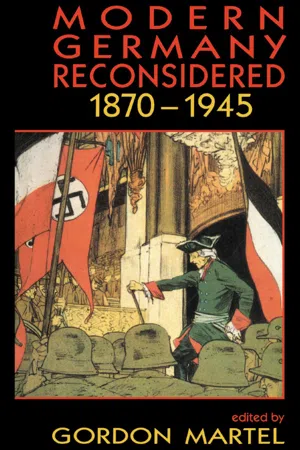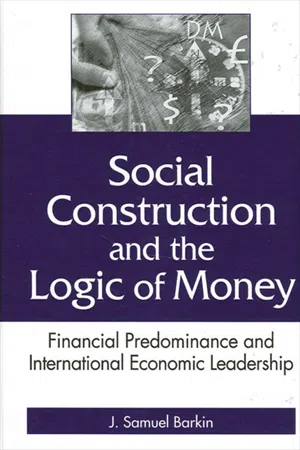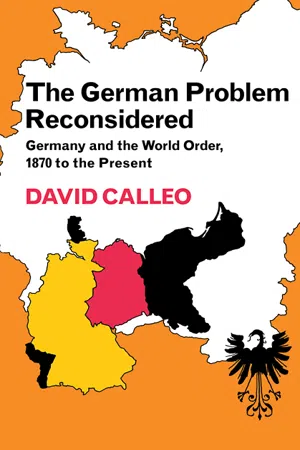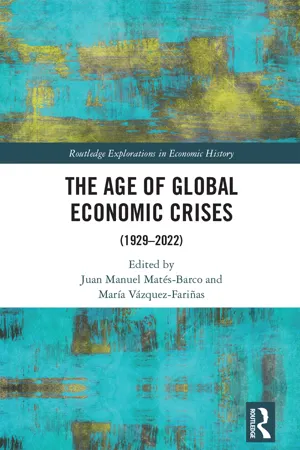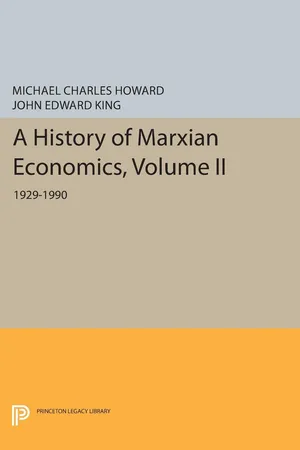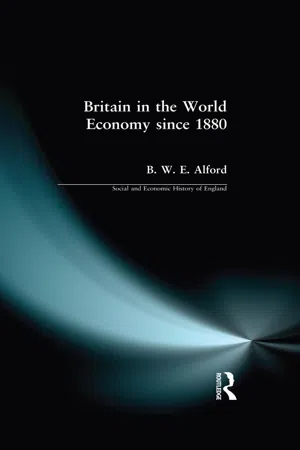History
Germany in Great Depression
During the Great Depression, Germany experienced severe economic hardship marked by high unemployment, hyperinflation, and political instability. The economic crisis contributed to social unrest and political extremism, ultimately paving the way for the rise of the Nazi Party and Adolf Hitler's ascent to power. The Depression had a profound and lasting impact on Germany's economy, society, and politics.
Written by Perlego with AI-assistance
Related key terms
1 of 5
9 Key excerpts on "Germany in Great Depression"
- eBook - ePub
Modern Germany Reconsidered
1870-1945
- Gordon Martel(Author)
- 2002(Publication Date)
- Routledge(Publisher)
11
The Economic Dimension in German History
FRANK B.TIPTONEine Industrie lä ß t sich nicht von heute auf morgen schaffen.Ernst Engel.1INTRODUCTION
As both an economic and a political great power Germany has been at the center of the forces shaping the modern world, though in an oddly contradictory way. Economically, despite the wrenching interruptions of depression and war, Germany stands out as an obvious success when measured against any of the economist’s standard yardsticks. Equally obviously, in the political realm Germany became the home of the most gruesome failure in world history. The nature of the connection between economic success and political failure has compelled the attention of many historians. However, none of those who attempt to link the development of German capitalism to the rise of Nazism has won general acceptance for their arguments, regardless of whether they believe that Germany was excessively capitalistic, or that Germany was not capitalist enough. Consideration of more limited questions has not fared much better. Numbers of scholars have argued that specific changes in Germany’s political constitution exercised decisive influence on the economy, for instance with the foundation of the Bismarckian empire in 1871, the Nazi seizure of power in 1933 and the ‘Nazi economic recovery’, or the ‘zero hour’ of 1945 and the ‘ Wirtschaftswunder’ in the West German Federal Republic. On the other hand, on other occasions economic development is held to have led to a political transformation. The Great Depression of 1873–95, the inflation of 1923 and the economic collapse of 1929 have all been cited in this way. However, unification, the Nazi economic recovery and ‘ zero hour’ all tend to fade away when subjected to closer analysis, and the asserted impact of economic crises on political life also appear less certain when examined in detail. - eBook - ePub
- Martin Kitchen(Author)
- 2019(Publication Date)
- Routledge(Publisher)
7 THE IMPACT OF THE GREAT DEPRESSION 1873–1895The Political Consequences of the Depression
As historians compile and analyse the statistical data of the period, the picture of the Great Depression becomes ever more differentiated, complex and contradictory, to the point where it has been seriously suggested that the term ‘Great Depression’ is without any analytical value. As far as the experience of Germany is concerned, the simple dating of the Great Depression from 1873 to 1896, with a first period to early 1879, a brief period of modest recovery to January 1882 and a second period of depression to 1896, has some value as a means of sorting out the available material into manageable periods. It tends, however, to magnify the effects of the depression, to overlook the degree to which many key factors in the period such as the effects of overseas trade, changes in the terms of trade or the fall in prices were set in motion before the onset of the depression. But in psychological terms there can be no doubt that there was indeed a depression. The economic hangover after the heady days of the foundation of the Reich plunged businessmen into the darkest gloom. Contemporaries were unanimous in their opinion that times were bad and were getting worse, and that industrial capitalism fluctuated between times of prosperity, when the workers made outrageous demands and the prices of raw materials rose, and depression, when business was forced to cut its own throat with price reductions, production restrictions and low profits.In large part this was due to the exceptional performance of the economy in the boom years since 1848. Temporary set-backs in 1857 and 1866 were only short interruptions in almost thirty years of high profits and rapid expansion. The depression showed that industrial capitalism was not necessarily synonymous with endless expansion and boundless prosperity. Nor was the structure of the German economy an unchanging and immutable fact, for it had to make major and often painful adjustments in order to accommodate itself to the changing world economic situation. - eBook - PDF
Social Construction and the Logic of Money
Financial Predominance and International Economic Leadership
- J. Samuel Barkin(Author)
- 2012(Publication Date)
- SUNY Press(Publisher)
93 5 The Interwar Period and the Great Depression The dynamics of international economic and monetary leadership can be illustrated by examples both of the presence of successful leadership and by its absence. The Great Depression of 1929–1939 represents perhaps the greatest failure of the global economy in the modern era. Its first few years are a classic story of international noncooperation and its potential effects. The period between the two world wars more generally was one of uncertainty in international relations, when lead- ership is needed most. This example is salient to the contemporary international political economy, with its financial implosions and its trade disputes. Now, as then, the international political economy ap- pears to be in transition, and its leadership appears uncertain. 1 The previous two chapters told the stories of countries that acted to varying degrees as international economic leaders. This chapter tells the stories of countries that might have, but did not. Charles Kindleberger speaks of the inability of Great Britain to resume its prewar role of international economic leader, and the unwillingness of the United States to do so. 2 David Lake categorizes France as a “spoiler” throughout the interwar period, suggesting that even though it did not have hegemonic capabilities in this period, it played at least a sufficiently important economic role to have a significant impact on issues of leadership of the international economic system. 3 These three coun- tries were also the main players in the German reparations drama, the dominant international financial issue of the 1920s, and the central countries in the three currency blocs that resulted from the collapse of 94 Social Construction and the Logic of Money the international gold standard in the early 1930s. - David Calleo(Author)
- 1980(Publication Date)
- Cambridge University Press(Publisher)
Germany's Imperial Economy Introduction: The German Economy and the German Problem As the two preceding chapters indicate, economic consider- ations strongly affected Imperial German policy. The Great Depression led Bismarck to protectionism and a new con- servative coalition in the empire, while it hastened the unraveling of his alliance diplomacy in Europe. Fears and hopes for Germany's economic development were an inte- gral part of those broader geopolitical perspectives that guided German policy into the First World War. In short, even if traditional history has often neglected economic factors, their close interprenetration with general domestic and foreign policies is evident. Some historians carry the point further. A distin- guished German school of broad Marxist persuasion, which also owes much to Schumpeter, finds in Germany's eco- nomic formation the very key to the German problem. Hans-Ulrich Wehler, for example, argues that Bismarck's opting for state intervention in the economic and social 57 58 THE GERMAN PROBLEM RECONSIDERED fields made the years from 1879 to 1885, in effect, a second "founding period" for the Reich. As Wehler sees it, Bismarck, to reconcile his authoritarian regime with a reac- tionary society, an advanced capitalism, and a depression, fixed Germany on a course of imperialist expansionism abroad and reactionary politics at home. Protectionism and imperialism furnished the means both for a countercyclical policy to mitigate the crisis of overproduction and for the continual legitimizing of his authoritarian regime. That regime had behind it a reactionary social coalition. Big agriculture and heavy industry were united to expand Ger- many abroad and block democracy at home. Wehler is preoccupied with his own country's internal development and not much interested in comparisons with other nations. As I read him, he is not trying to prove Germany more "imperialist" than Britain, France, or the United States.- eBook - ePub
From Unification to Nazism
Reinterpreting the German Past
- Eley Geoff(Author)
- 2019(Publication Date)
- Routledge(Publisher)
after the real period of depression in the 1870s, certainly outlived the overall period 1873–96, and in many ways only fully appeared in the 1890s and after.V
It will be clear from the general drift of my remarks that I think the political impact of the Great Depression has been greatly overstated, and given the space I would argue that the 1890s witnessed a far greater change in the character of the political system.31 The status of the ‘Great Depression’ as a meaningful period is itself rather doubtful, and still awaits systematic discussion amongst German economic historians. Similarly, the longer view elaborated upon it, that between 1873 and 1896 developments were laid down that culminated several decades later in the triumph of fascism, also needs to be more adequately expressed. The suggestion that as a result of the Great Depression some old authoritarian structures became deeply entrenched and certain new ones created, partly by the clever manipulations of the ‘old élites’ and partly by the social psychological effects of popular disorientation in a period of accelerated and irregular industrialization, has become a well-worn convention of much German historiography. But the idea that ‘prefascist’ potentialities were thereby unleashed, to be strengthened by the manipulations and mobilizations of the Wilhelmine era, is ultimately too glib and question-begging an interpretation. As I argue in the concluding essay of this collection, this encourages the belief that fascism was preordained by malformations in the initial stages of capitalist industrialization. It resulted from the incompleteness of the original societal transformation, when too many features of the ‘pre-industrial’ society were left intact which should have been swept away, and not from the authentic contradictions of an advanced capitalist society itself.32 - eBook - ePub
The Age of Global Economic Crises
(1929-2022)
- Juan Manuel Matés-Barco, María Vázquez-Fariñas, Juan Manuel Matés-Barco, María Vázquez-Fariñas(Authors)
- 2023(Publication Date)
- Routledge(Publisher)
1 The Great Depression of 1929 Crisis in the world economyJuan Manuel Matés-BarcoDOI: 10.4324/9781003388128-11.1 The Western economy in the early 20th century
The 20th century was marked by dramatic upheavals: two world wars – of great severity and destruction – and several economic crises. The interwar period (1918–1939) ran from the end of the First World War to the beginning of the Second World War. During these years, two events stand out: the birth of the Soviet Union and the economic crisis of 1929. In this chapter, we will deal with the second of these events.The outbreak of the First World War upset the international equilibrium of the early years of the 20th century. Until 1914, the political rivalry of the great powers had not generated tensions of such scope and gravity. From that year onwards, events far outstripped the attitudes of politicians and rulers (Casanova 2011). After an acute post-war crisis followed by a short depression in 1920, the industrialised countries of the West benefited from a period of expansion that lasted until 1929 (Aldcroft 1989). Political, social, and economic life had weakened in Europe, and some countries were on the verge of bankruptcy in the early post-war period. Growth during these years was very uneven. Britain suffered through a precarious situation after the deflationary experience of 1925, which led to a return to the gold standard; France endured tremendous instability; and Germany was plagued by terrible hyperinflation. In Spain, economic growth was similar to that experienced in the rest of Europe and coincided with the favourable international environment after the war. However, by 1930, the difference in Spanish GDP per capita compared to the most advanced countries was still considerable (Carreras and Tafunell 2010; Sánchez and Catalán 2013). The fragile foundations of the Roaring Twenties - eBook - PDF
- Michael Charles Howard, John Edward King(Authors)
- 2014(Publication Date)
- Princeton University Press(Publisher)
Part I The Great Depression and Stalinism 1 Marxian Economics and the Great Depression I The Last Crisis of Capitalism? The Great Depression was by far the most severe economic crisis in the history of capitalism. In the United States real GNP fell by 9.9 per cent in 1930, a further 7.7 per cent in 1931, and by 14.8 per cent in 1932. In the latter year industrial production in both Germany and the US was no less than 47 per cent below its 1929 level (for the other capitalist powers the collapse was less complete, but nevertheless severe). 1 Marxian economists asked two questions about this cataclysm. What did it mean for the future of the capitalist system and the prospects for socialism? And how could it be explained consistently with Marx's theory of crisis? Neither question was simple. Marx's theory of capitalist crisis was nowhere well worked out, nor, indeed, even organised systematically, while the political history of the 1930s involved novel developments. The most notable phenomena were the success of fascism in Germany, the New Deal in the United States and the growth of state intervention elsewhere. They raised once again the question of the state's role in modern capitalism and the basis of mass support for reaction or reform rather than revolution. There was no agreement among Marxian theorists concerning the nature of the crisis. Initially, at least, German Social Democratic economists found little to be excited about. The Great Depression was 'neither Young-crisis nor rationalisation-crisis, nor total breakdown of the capitalist system nor herald of the world revolution', Fritz Naphtali wrote in 1930, 'but typical crisis O/ the capitalist system with historical peculiarities, as are revealed by every crisis'. - eBook - ePub
Europe Contested
From the Kaiser to Brexit
- Harold James(Author)
- 2019(Publication Date)
- Routledge(Publisher)
4 Europe and the world of the DepressionThe year 1929 marked the realization that all was not well in European politics. “Crisis” rapidly became the most over-used word in the political vocabulary, and the idea of “crisis” was intertwined with the memory of conflict and war. The Soviet newspaper Izvestia marked June 28, the fifteenth anniversary of the assassination of the Austrian archduke in Sarajevo, by stating that the new era was an “interwar period” (a phrase which is now of course a common characterization).1The New York Stock Exchange crash of October 24, 1929, is conventionally taken as the beginning of the Great Depression, and the end of the illusion of prosperity. Another October date that marked the end of an illusion of peace had occurred three weeks before: on October 3, the Foreign Minister of Germany, Gustav Stresemann, who had rebuilt German relations with the western powers, died of a heart attack. Another architect of the postwar order, Georges Clemenceau, died on November 24.The Great Depression, the crisis of democracy, and the crisis of the international system, are all closely linked. The economic crisis put great, and frequently intolerable, strains on democracy. The price collapse of agricultural products destroyed the precarious livelihoods of peasant producers, and turned them against the state. In the industrial areas of Europe, unemployed workers were alienated; they often included in the objects of their attack traditional labor organizations that seemed blind to their plight. On a global level, the malfunctioning of the international economic order, and in particular the drying up of the world’s capital markets, reduced the rewards for good behavior internationally, and made defiance of the international political order much more attractive. As a beginning of what would prove to be a long slide to international anarchy and lawlessness, Japan soon defied the League of Nations in Manchuria, and Benito Mussolini’s Italy flexed its muscles in the Mediterranean. - eBook - ePub
- Bernard W.E. Alford(Author)
- 2014(Publication Date)
- Routledge(Publisher)
Nevertheless, the rising economic power of other nations, especially that of Germany, had clearly been recognized as a matter of concern in Britain for some time, and the severity of their subsequent economic problems gave rise to an attitude of Schadenfreude that provided a kind of vicarious reassurance that, after all, the British economy had proved to be more stable and durable than its major rivals. But even under these conditions Britain’s position in world trade continued to slide. 24. James, The German Slump. 25. An excellent short account is J. Potter, The American Economy Between the Wars (1974). A good basic text is P. Fearon, War, Prosperity and Depression. The US Economy 1917–45 (Oxford, 1987). Table 5.6 UK comparative trade shares, 1929 and 1937 (% world total) As to the broader picture of economic and social change, some historians claim that during the 1930s there were important developments in state provision of welfare benefits, reflecting the emergence of new principles of social policy which expanded to form the basis of post-Second World War welfare state. 26 Yet to the extent that there were changes, they did not involve significant costs or anything that could be described as radical institutional reform. To the contrary, the stress on the need for economic stability and orthodoxy enormously strengthened the traditional institutions of government, especially the Treasury. And, somewhat ironically, social pressures were eased by the favourable movement in the terms of trade. Despite Britain’s poor export performance, the price of imported foodstuffs, in particular, fell dramatically, with a consequent effect on real incomes for the mass of the people. Agricultural depression, which was such a major destabilizing force in many countries, had only a weak effect in Britain because of the contraction in the industry that had occurred much earlier as part of the process of the development of an export economy
Index pages curate the most relevant extracts from our library of academic textbooks. They’ve been created using an in-house natural language model (NLM), each adding context and meaning to key research topics.
